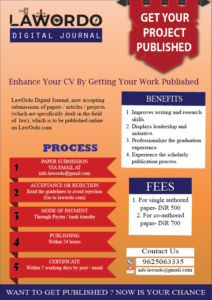The Art of Advocacy

Co-Authors:-
Bhawani Shankar & Rahul Vishnoi
Manipal University Jaipur (B.A LL.B Hons)
The profession of an advocate is one which if done sincerely can garner tremendous fruits both in regard to personal development and as well as for the development of the society. Notwithstanding any opinions, advocacy is still regarded as a noble profession; the credit for the same is accorded to the impeccable system of our Indian Judiciary which maintains and supervises a high moral ground in the judicial system.
In this article we will try to understand the enrollment of advocates, to practice, in courts, what should be the ideal etiquettes, qualities, morals/principles of an aspiring advocate and his ideal rapport with clients and his social relation with regard to the society.
Enrollment and the role of the Bar Council
In the British era, whoever wanted to practice in the Jaipur High Court, it was a necessary pre requisite that such person must compulsorily practice for a period not less than 2 years outside the Jaipur princely state.
Earlier, under the Bar Council Act, 1926, in order to practice in High court, the potential advocate has to be enrolled in the State Bar by the panel of 2 Justices and 1 Bar Council member to practice in the High Court.
Whereas in order to practice in lower courts (District Courts), a six months internship and as well as not less two years as a Pleader Grade First was a necessary prerequisite in order to practice in these courts and to be accorded the title of Pleader Grade I, the aspiring advocate had to apply for a membership to the session courts judge and then such membership had also to be renewed on an yearly basis.
I n 1961, a new Advocate Act was enacted and the institution was given the sole power in regard to the enrollment of the potential advocates and in 1961, the first Bar Council of Rajasthan was constituted under the chairmanship of Shri Hasti Mal Parikh( Term- 1961-1964).
Ideal Qualities to become a successful Advocate
A good advocate should always abide by the principles that he hold, it is the bedrock of his character. If such advocate is head to head with any difficult circumstances he must always stay true to his morals, that is the key to success in the long term.
The devil is in the details, an advocate should always read any fact in issue, word by word in order to properly comprehend the subtleties in the issue at stake and it definitely helps the advocate to present the big picture in an effective manner.
Early to rise and late to bed, that is the key to become a successful advocate, it means that a good advocate should always arrive early at work and should be the last one to leave the workplace; it defines your seriousness, honesty and diligence towards your profession.
Core Principles of Advocacy
The profession of advocacy requires full commitment towards your work and every advocate must consider it as a full time affair, self-immersion must be the keystone to be adhered in the field of advocacy.
Advocacy from time immemorial is considered as a noble profession and its object is considered a service to the society but nowadays because of the changing dynamics of the society, the morals of the advocates have been affected which has led to the conversion of this profession into a business venture. The solution to the same should be that we must accept that changing dynamics is an eternal truth but the vital point is that we should remain honest to our profession even if we are taking monetary consideration.
One of the key characteristic of an advocate should be that should be a sharp- hermit, that is, he must try to learn and remember things and must not depend on others for the same.
An advocate should inculcate the habit of reading, it will help him to widen his horizons and will also help him to cultivate his mind and present his views more effectively by touching on different dimensions.
Last but not the least , an advocate must also possess the quality to assess the character of his clients and judges, as it helps him a lot to effectively tackle the day to day dilemmas in a more practical manner.
Witness Examination: An Art
Witness examination is an art and an advocate to get success in that dimension has to become an artist, that is, an advocate should have an ability to assess the psychology of a witness. It is imperative to understand the character of the witness in order to properly examine him in regard to the fact in issue. One important caution to keep in mind is that questions asked to the witness must not always be directly asked on the facts in issue, the advocate must possess the ability to first beat around the bush and then at the right time, the ability to ask the imperative questions, and to do that, it requires a skill.
There are different characters of witnesses and it requires different set of skills to examine them precisely:
- Lying Witness- An advocate should first ask the incidental questions to the main cause, as it will help in determining the motive of the witness, then the advocate should poke him consistently about both the questions to draw out a logical conclusion.
- Flippant Witness- Some witnesses, mostly women, tend to comprehend a serious matter in a light way. Thus the best way to examine such witness is to make them realize the seriousness of the issue at stake.
- Dogged/Stupid Witness -Some witnesses are adamant in nature. Thus the correct way to examine such witness is by asking questions in small and as well as half sentences.
- Hesitating Witness-They tend to focus more on the consequences of their answers. So the best way to examine them is by asking questions rapidly, that is, one after another.
- Humorous Witness- These witnesses are not interested in the facts in issue, and they tend to avoid these questions in a humorous way. The best way to examine them is by emulating the humorous nature of the witness.
- Cunning/Partly Truth/ Hypocrite Witness- While giving the evidence they tend to add fictional content to their answers. The best way to examine them is by focusing on the fictitious addition in order to draw out the correct conclusion.
- Professional Witness- These witnesses are sham witnesses. In order to examine them, the advocate should assert the same in a cunning way by asking questions about their profession.
- Official Witness- These witnesses consider themselves as a separate and upper class of witnesses. The best way to examine them is by reminding them of their moral high grounds and their adherence to their professional duties.
- Truthful Witness-These witnesses consider the truth as a great virtue and they hate falsification. The correct way to examine them is under the light of the relation of the accused and the witness.
- Expert Witness- These witnesses are medical experts, handwriting specialists, engineers, etc. The correct way to examine them requires, on the side of the advocate, a good amount of knowledge in regard to their expertise.
In toto, the skill to examine a witness prerequisites the advocate to go through the Challan(Final Report), as it contains all the evidences regarding the accused and it acts akin to the base on which he can form his case and to formulate the best way to examine the witness.
Conclusion
Art of advocacy is a subtle art; an advocate must possess the quality to assess the character of his clients and judges, as it helps him a lot to effectively tackle the day to day dilemmas in a more practical manner.
One of the key characteristic of an advocate should be that should be a sharp- hermit, that is, he must try to learn and remember things and must not depend on others for the same.
An advocate should inculcate the habit of reading, it will help him to widen his horizons and will also help him to cultivate his mind and present his views more effectively by touching on different dimensions.
The advocate should know the art to create a labyrinth of words in order to assess the legal and practical prowess of the judge, as it helps profoundly to assess the character of the judge and what should be the best way to deal with him.
This art is a lost art but it can recover easily by correct means, proper guidance by teachers and last but not the least, the professional course of LL.B can become the correct means to achieve this end.
1 V. S. Dave J. EK ADALAT ANTARMAN MEIN (1st ed. 2017)
2 V. S. Dave J. EK ADALAT ANTARMAN MEIN (1st ed. 2017)

